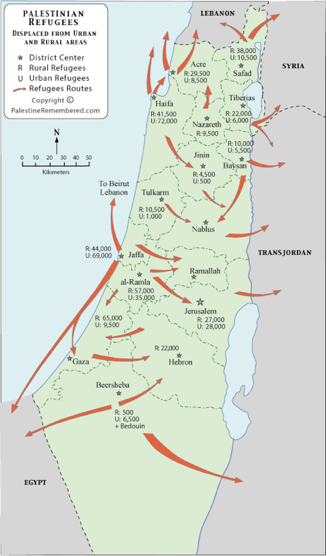At a Glance
- UNRWA registered approximately 425,000 Palestine refugees in Lebanon, with the majority living in one of Lebanon’s twelve refugee camps. This number excludes the non-registered refugees, which UNRWA also extends aid to.
- Palestine refugees comprise ten percent of Lebanon’s population.
- Palestine refugees in Lebanon are denied several basic human rights that are granted to other foreign workers, such as the right to work in over 70 professions. Because Palestine refugees are not considered citizens of another country (since Palestine is not regarded a country), the reciprocity clause granting foreign workers rights does not apply to Palestinians. Therefore, Palestinians remain citizenless and denied basic rights, yet they have been in Lebanon for over sixty years.
- UNRWA-Lebanon oversees seventy-five schools including 33,000 pupils and two vocational and technical training centers.
- The health services available to Palestine refugees in Lebanon include: twenty-nine primary health centers, one community rehabilitation center, nine women program centers.
- These figures reflect data as of 31 December 2009
Challenges
Palestine refugees in Lebanon rely almost entirely on UNRWA for education, health, and relief and social services, since harsh civil and social laws prevent self-sufficiency. The main challenges the Palestine refugees face include the lack of social, civil, or legal rights, inaccessible public social services, and poor public health or educational facilities.
Hospitalization
Although UNRWA provides basic primary healthcare, supports the cost of secondary hospital care and partial tertiary care, it is unable to support hospitalization costs. As hospitalization costs are beyond the refugees’ means, a difficult choice must be made between foregoing dire medical treatment and astounding debt.
Employment
Palestine refugees are subject to employment restrictions. Therefore, the majority are highly dependent on UNRWA as their main relief provider and employer. In 2005, officially registered Palestine refugees born in Lebanon were allowed for the first time to legally work in the clerical and administrative sectors. Nonetheless, refugees are still unable to work in certain professions as doctors, dentists, lawyers, engineers or accountants, to name a few.
The refugee workforce is substantially under-employed. Although some Palestine refugees secure work in Lebanon, the work is often seasonal or casual for a low wage and with no social and welfare benefits.
The employment crisis has proven to weaker the community’s commitment to education. Many young people have no desire or purpose to continue their sub-par education if there are no opportunities available. Most will drop out and find manual work to better support their families.
The Protection Gap
Palestine refugees are unprotected under the UN Refugee Convention and other bodies and charters created to protect refugees. The UN adopted the Refugee Convention and established the UN High Commissioner for Refugees, but excluded Palestinians under the UNRWA mandate from receiving the same coverage as those under UNHCR’s mandate. In short, UNHCR does not provide assistance and/or protection to Palestine refugees in the five areas where UNRWA operates. Consequently, Palestine refugees are caught in a “protection gap” and receive fewer protections than other refugees. The drawback is UNRWA is mandated to provide Palestine refugees with humanitarian assistance only, whereas UNHCR is not limited to a specific protection mandate.
Refugee Camps
The 12 Palestinian refugee camps in Lebanon are:
Ein el-Hilweh — 45,967 registered residents
Nahr el-Bared — 31,303
Rashidieh — 29,361
Burj el-Shemali — 19,074
Beddawi — 15,947
Burj el-Barajneh — 15,718
El-Buss — 9,508
Shatila — 8,370
Wavel — 7,668
Mieh Mieh 4,569
Dbayeh 4,025
Mar Elias 616
Palestinian Refugees’ Origins in Palestine










